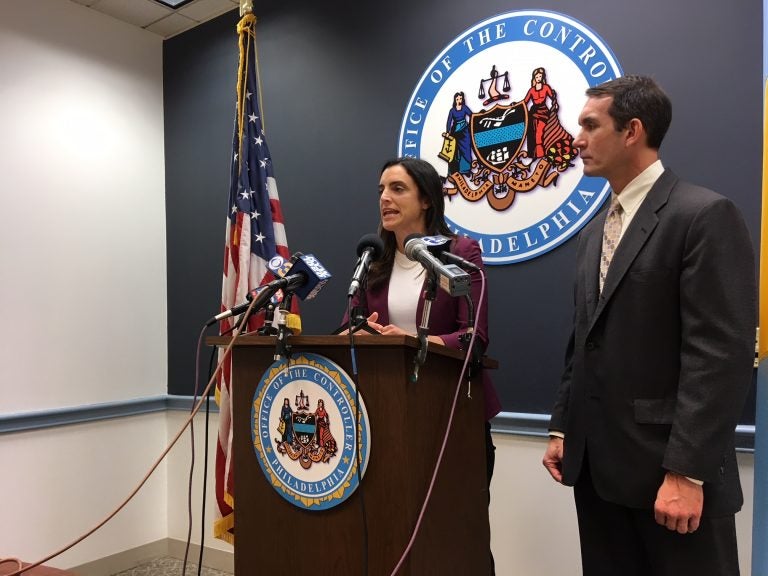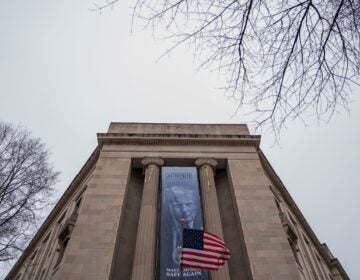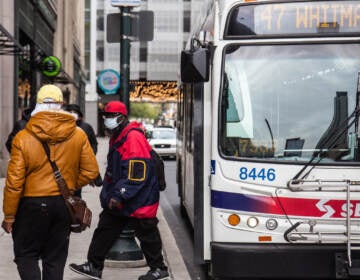City Controller takes aim at Parking Authority’s spending
City Controller Rebecca Rhynhart announced her office would audit the Philadelphia Parking Authority’s on-street parking enforcement expenses
Listen 2:01
City Controller Rebecca Rhynhart announces an audit of the PPA as Pa. Auditor General Eugene DePasquale looks on (Jim Saksa/WHYY)
Nobody really likes to get a parking ticket. And no one really likes to get audited. Now, both these things nobody really likes are coming together, as City Controller Rebecca Rhynhart announced her office would audit the Philadelphia Parking Authority’s on-street parking enforcement expenses and its progress on implementing recommendations in a 2017 report from state Auditor General Eugene DePasquale.
Flanked by DePasquale at a press conference Wednesday, Rhynhart said the PPA had earned residents’ “distrust” thanks to a sexual-harassment scandal in 2016 that forced the authority’s then-executive director, Vince Fenerty, to resign, plus “the authority’s increased enforcement of on-street parking activity throughout the city.”
The Parking Authority’s current executive director, Scott Petri, said he welcomed the controller’s audit.
“The City Controller’s Office really hasn’t audited the PPA in 10 years,” said Petri. “It’s been a decade already, and you shouldn’t wait two decades to come see us, you ought to check in now.”
“Of course, nobody ever really ‘welcomes’ an audit,” Petri added, “but as the executive director, the chairman [of the PPA board, Joe Ashdale] and I welcome the opportunity to have an analysis of where we can be better. You can always improve.”
Rhynhart’s audit will focus on on-street parking expenses because the PPA essentially sends its profits — revenues after expenses — from on-street parking to the City of Philadelphia and the School District of Philadelphia in accordance with a complicated formula set by state law. The city treasury gets the first $35 million the PPA makes from on-street parking, plus a cut of every dollar after that. The rest goes to the schools.
Advocates for more school funding have long derided the PPA about these funds, arguing that the authority’s bloated payrolls were effectively robbing schoolchildren of book money. The PPA has pointed the finger at Harrisburg, saying it’s the mandate’s fault, not the authority’s.
Last fiscal year, the PPA managed to send $13.2 million to city schools, a $3 million increase over the previous year. The city also received $38.3 million from the PPA’s on-street parking funds.
In the wake of Fenerty’s resignation, authority officials said they overhauled sexual-harassment policies, revamped hiring and promotion policies, banned nepotism hires, and updated employee training. Part of the controller’s audit will be checking to see that the authority actually did what it says it did.
The other half of the review will focus on the authority’s spending habits, particularly in the on-street parking division. Rhynhart said she has two basic inquiries: “Are the staffing levels reasonable or not reasonable? Are the salaries reasonable or not reasonable?”
The PPA has long been considered a patronage mill, one dominated by the vestiges of Philadelphia’s Republican machine since the state took it over in 2001 and filled the board with local GOP leaders. Since then, the number of employees has doubled, to more than 1,000.
But the authority isn’t solely the province of GOP patronage, said Rhynhart. “It’s not just a Republican patronage mill, it’s a Democratic patronage mill, too.”
“In both instances, it has had the reputation of being the place where friends and family members [of the well-connected] can go get a job,” Rhynhart added.
The executive director’s harassment scandal led to the auditor general’s audit, which made 117 recommendations to the PPA board to prevent further sexual-harassment and financial improprieties. At the time that audit report was released, the PPA said it had already implemented 80 of the recommendations. Today, Petri said “almost all” have been implemented.
According to Petri, the authority is now “100 percent compliant” on the sexual-harassment prevention measures. As for procurement, only “one or two” single-source contracts remain, and those are for maintaining old equipment no other vendors service.
Petri said some of the remaining recommendations are in the process of being implemented, pointing to reductions in employee benefits as an example. Per Petri, about 70 percent of PPA employees are unionized, meaning those changes will be negotiated as the labor contracts come up for renewal.
The state auditor general’s report also accused the PPA of failing to collect thousands of unpaid parking tickets over the years, costing the school district $78 million in revenues. Petri called that claim “unfair.”
“[DePasquale] dwelled on this $78 million of uncollected tickets, and it’s just not identified in the report where the heck is that number, how did he derive it — nobody has ever been able to ID where that number came from,” said Petri. “I think you can call it a total fabrication really just to grab a headline.”
According to Petri, the PPA has an 88.5 percent collection rate over a four-year period. According to a study for the authority by the tech firm Conduent, which holds contracts with the PPA and many other parking authorities to assist with ticket payments, that rate is above average.
But when asked, Petri said he didn’t think the audit was an election-year stunt by two Democrats.
“Nope, it’s not politics,” said Petri. “I don’t think this is politics at all.”
Governor Tom Wolf, a Democrat, called for returning the PPA to local control last year. Both Rhynhart and DePasquale have echoed that call.
Rhynhart said the audit should take about seven months.
WHYY is your source for fact-based, in-depth journalism and information. As a nonprofit organization, we rely on financial support from readers like you. Please give today.






